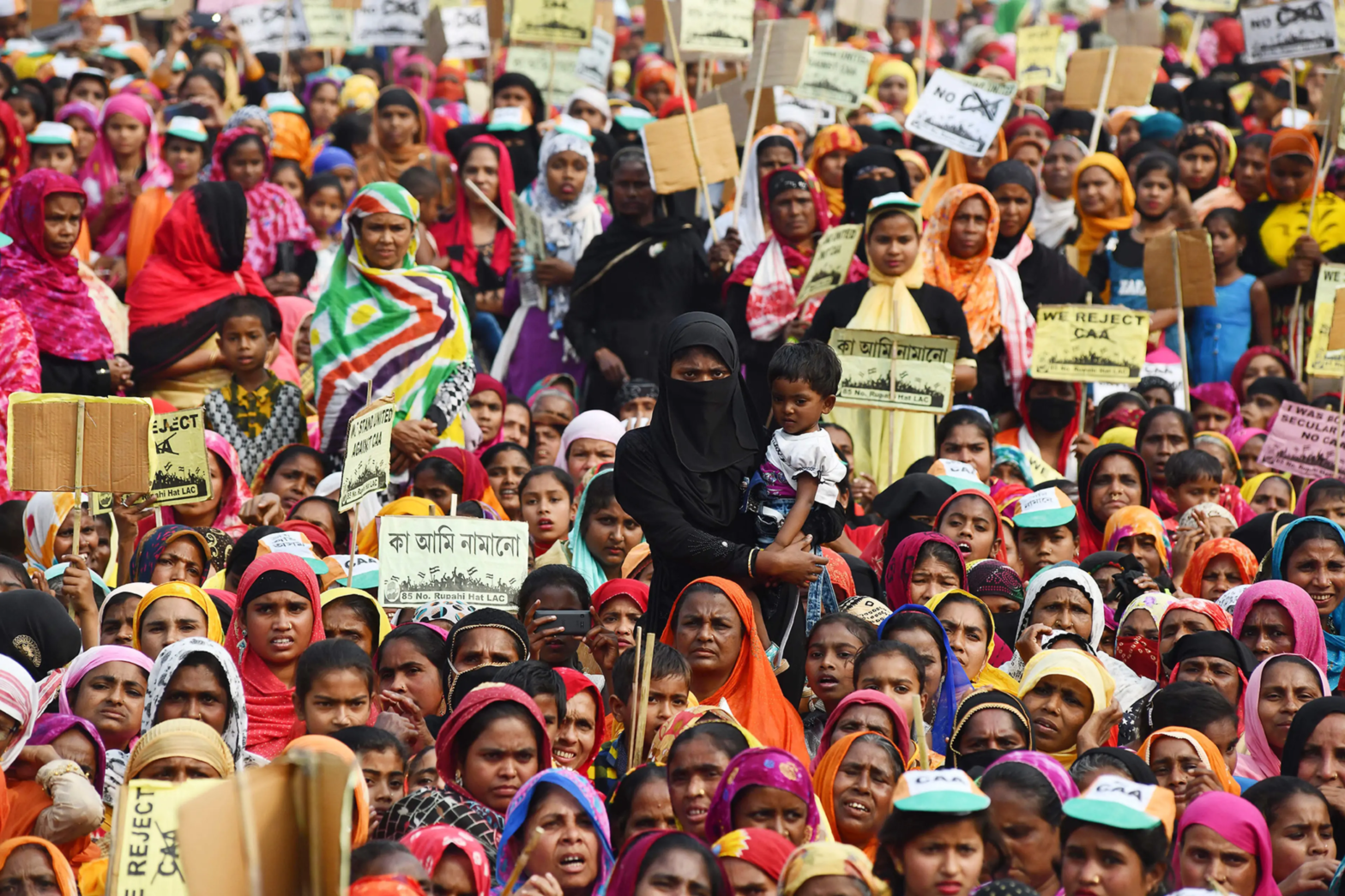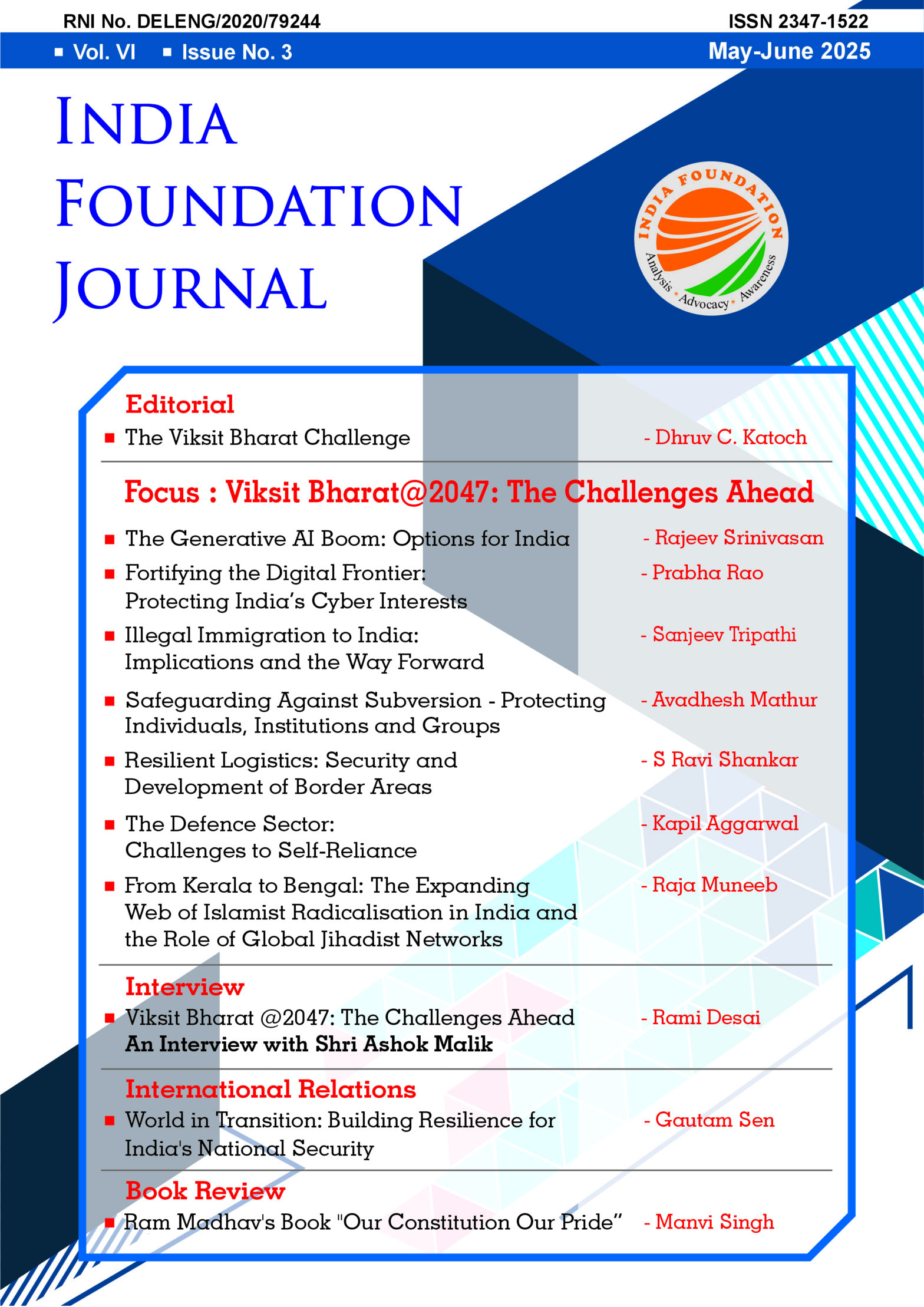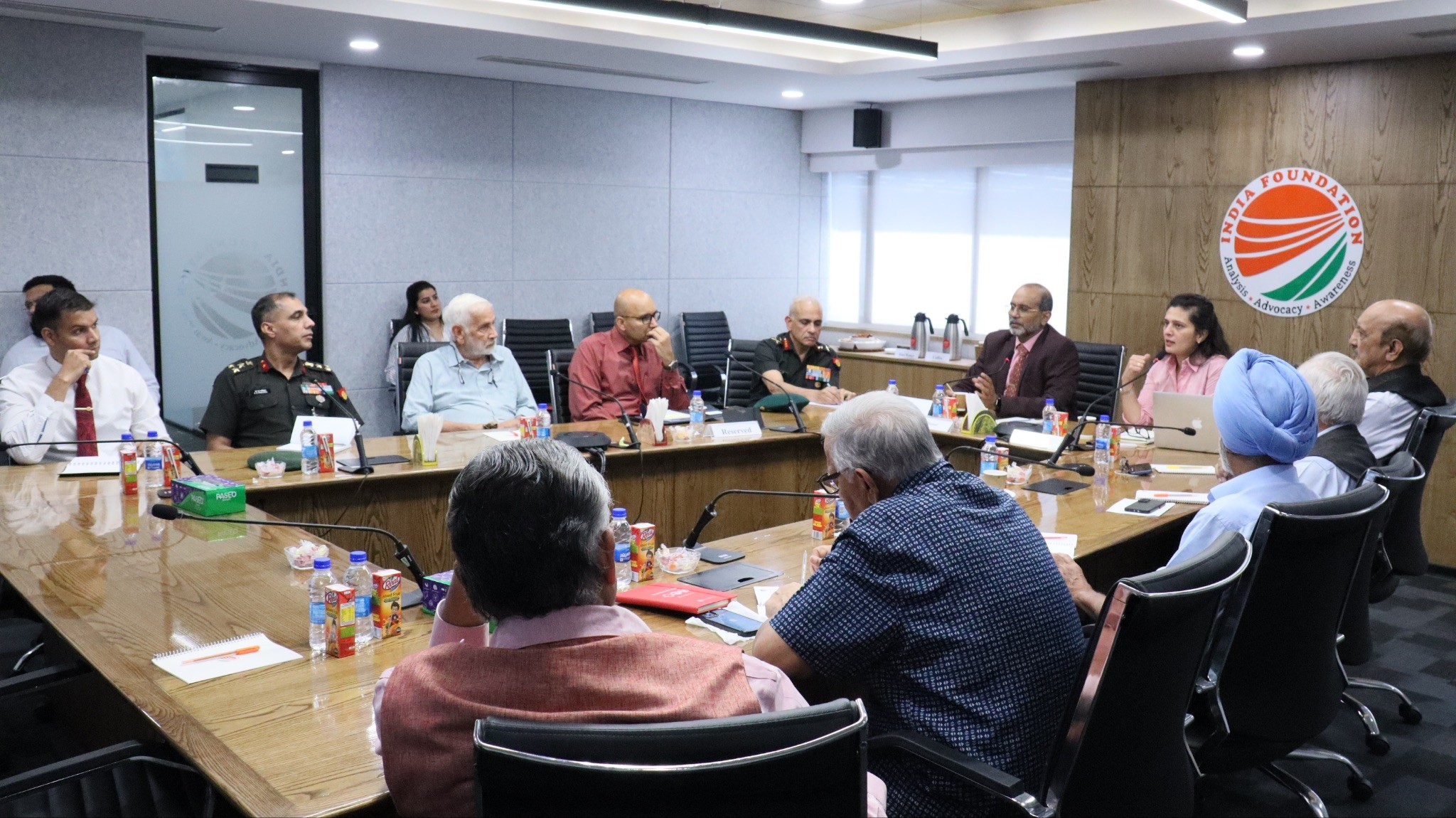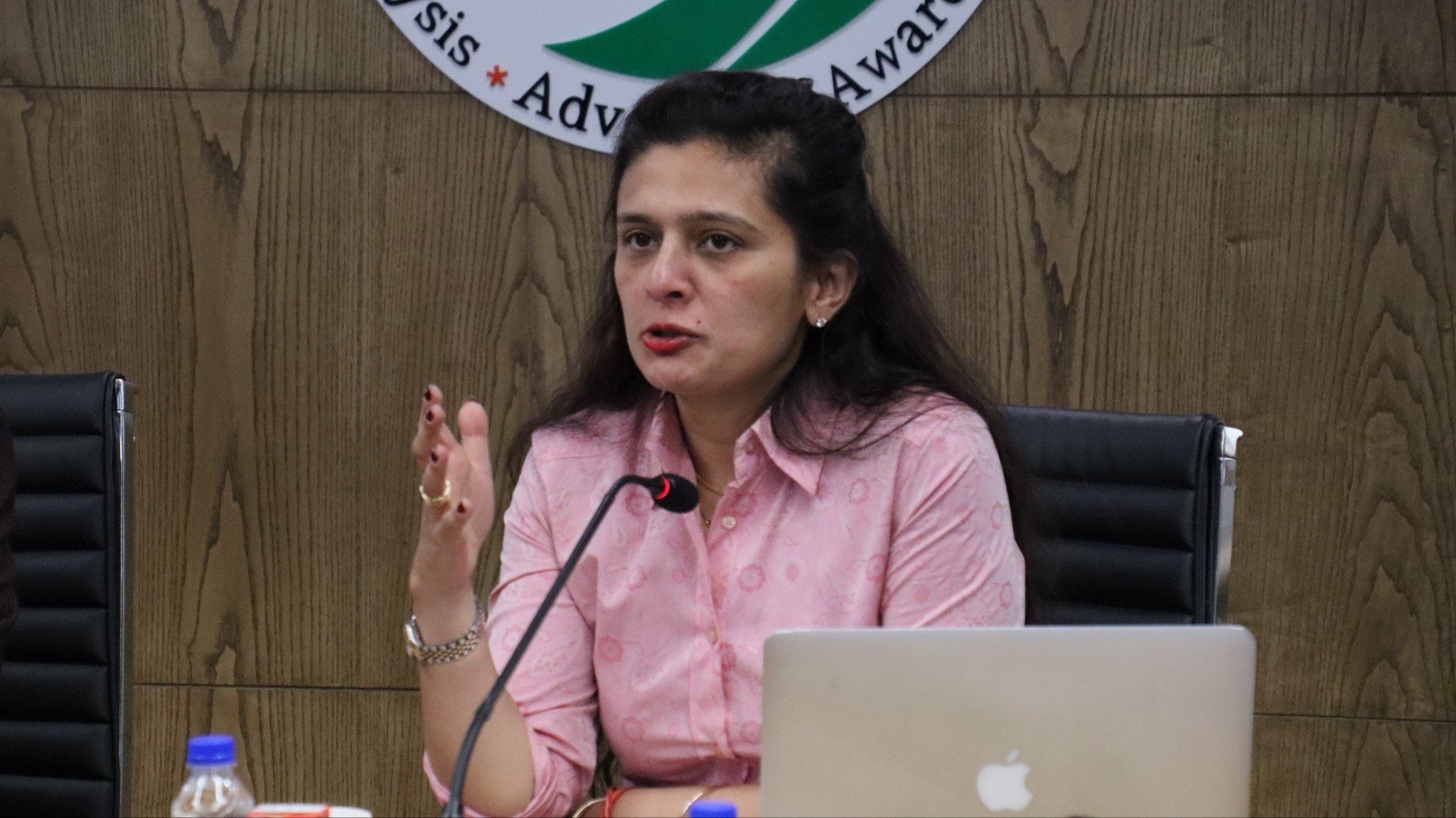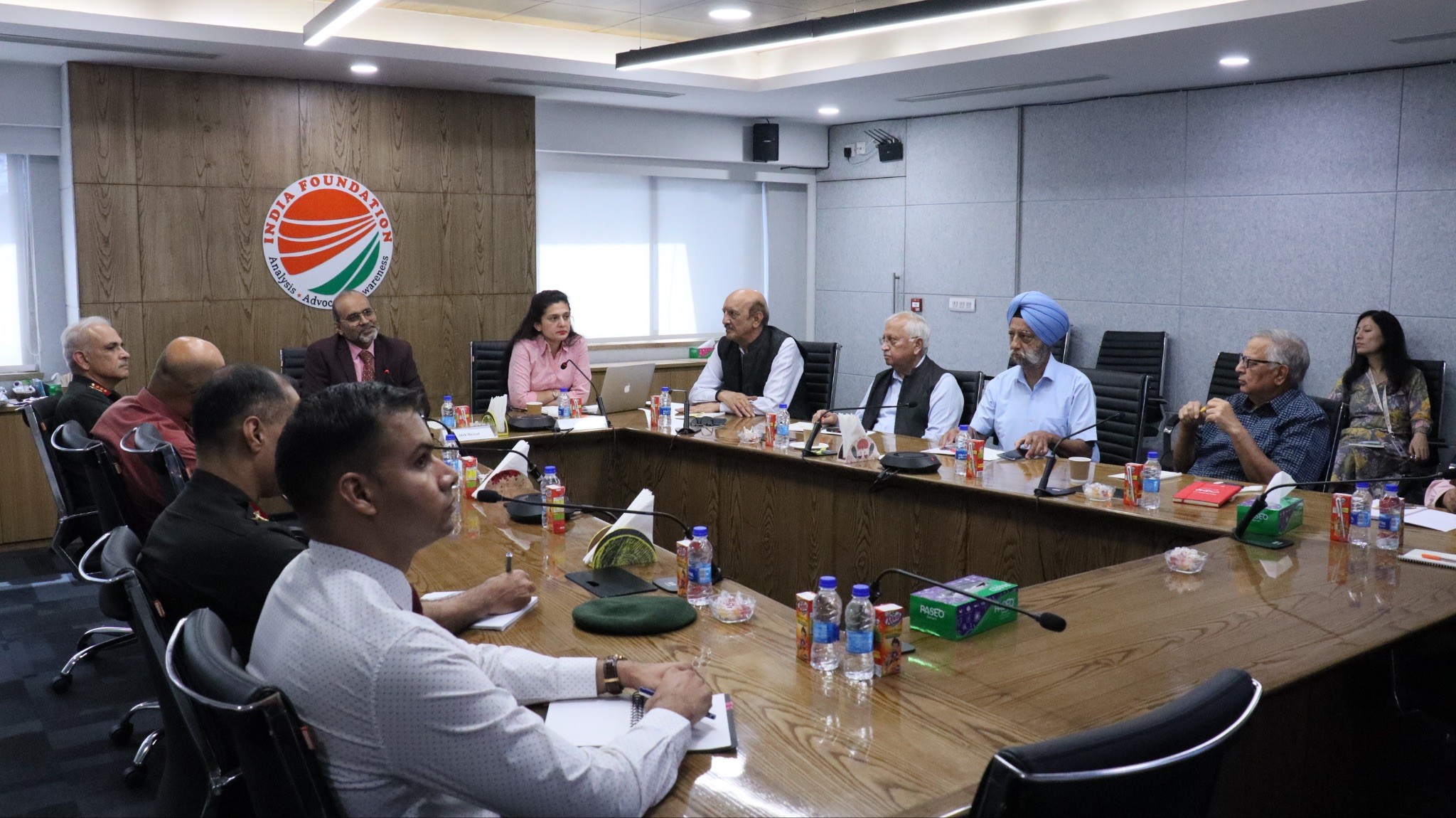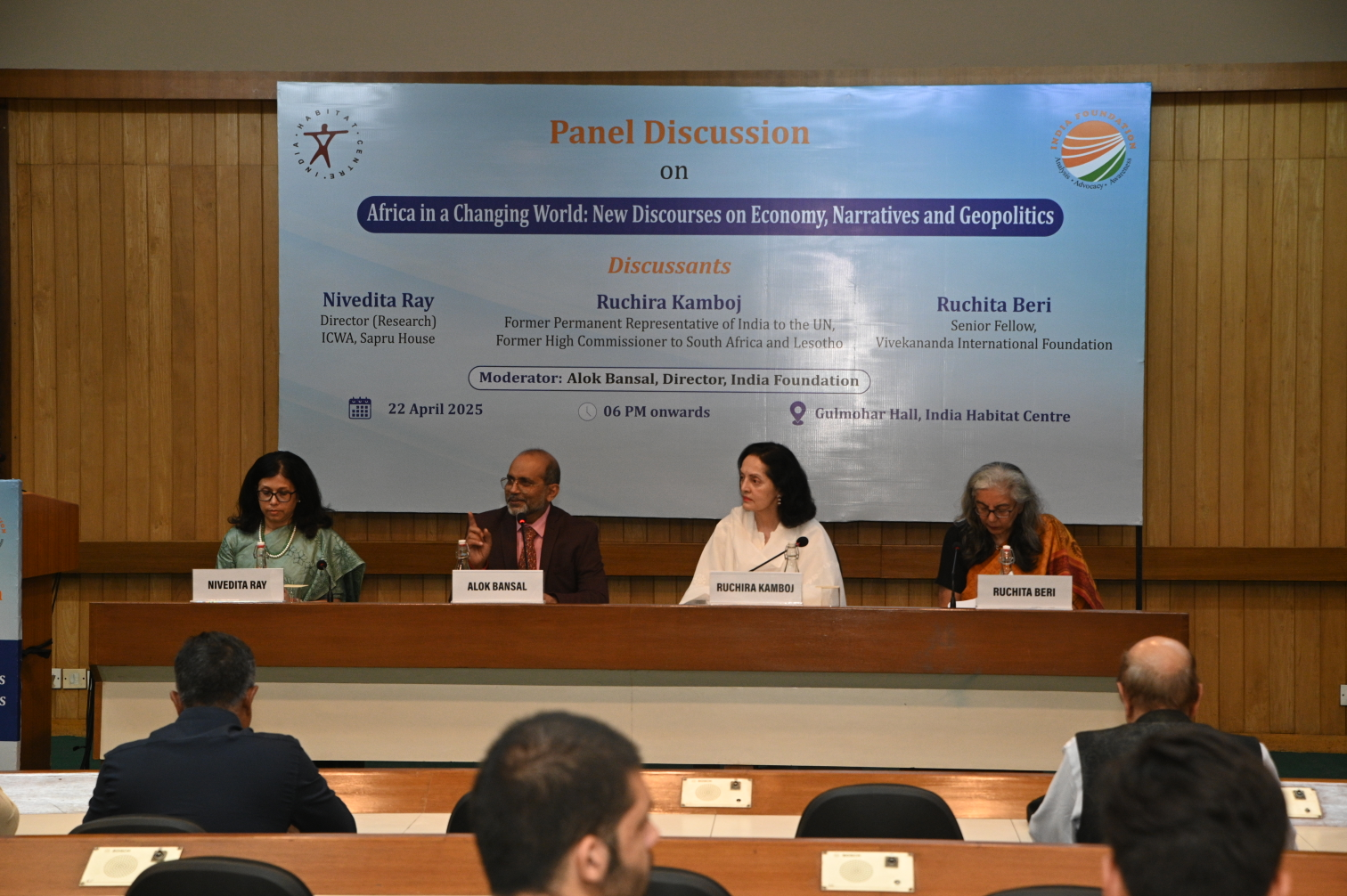The government unveiled the Atma Nirbhar Bharat policy (self-reliance) on 12 May 2020. The policy envisions boosting domestic manufacturing, improving infrastructure, and supporting MSMEs through economic reforms and incentives. It also aims to enhance local supply chains, promote innovation, and create a more self-reliant economy. The ultimate test of this policy’s success will be the effectiveness of the self-reliance policy in the defence sector, considering that the Ministry of Defence has the largest allocation of funds among all ministries each year, a significant portion of which is designated for importing military equipment, including aircraft, warships, guns, and tanks. Determining how to phase out these imports and gradually shift to indigenous design, development, and manufacture of state-of-the-art platforms and weapon systems will be a key factor not only in the success of the self-reliance initiatives in the defence sector but also in the overall accomplishments of the Atma Nirbhar policy.
The magnitude of the challenges to self-reliance in the defence sector is evident from the fact that for a long time, India has been the largest arms importer in the world. It is only during the recent period of 2020-24 that Ukraine has surpassed India as the largest importer, due to the war with Russia. According to the latest SIPRI report,[i] India still accounts for 8.3% of global arms imports for these five years, compared to a share of 9.1% during the previous five-year period of 2015-19. This decrease may be partly due to a focus on Atma Nirbharta, indigenisation, and enhanced ability to design and manufacture some military hardware. However, the import dependence remains significant as India continues to be the second-largest arms importer, indicating a strategic vulnerability from which India should extricate itself as soon as possible.
It will be worthwhile to compare the arms imports of India vis-à-vis China over the last 15 years. Based on the data provided in the SIPRI report, this is represented in the chart below. Just two decades ago, China was the largest arms importer in the world, its share of global arms imports being 12%. However, China’s import dependence has drastically reduced, and its share of global arms imports is now just 1.8%, a tribute to its indigenisation efforts. China now ranks 16th on the SIPRI arms importers’ list.

However, Mr. Bhartendu Kumar Singh feels that the import figures from China do not accurately indicate the prowess of its Military Industrial Complex (MIC). He states,[ii] “A sharp drop in China’s share of global arms imports may give the impression that its MIC has crossed a critical hurdle. However, it is premature to reach this conclusion as supply disruptions in Russia and Ukraine, among the largest arms suppliers to China, may have distorted the data. It is China’s dwindling share in global arms exports that provides a truer picture of China’s MIC.” This implies that multiple parameters must be accounted for when assessing self-reliance in defence manufacturing.
Defence Industries: A Multi-Faceted Asset
A capable defence industrial sector or base must be recognised as a multi-faceted national asset. It is critical for delivering security in an increasingly uncertain world. There are three core elements[iii], namely ‘Defence’ (policy formulation and implementation through decisions), ‘Industries’ (providers of goods and services) and Society (the source of manpower, other resources, discourses and permissions), which are culturally interdependent as they combine to generate the Defence Industrial Ecosystem. In the words of Ashton B Carter, the US Under-Secretary of Defence for Acquisition, Technology and Logistics[iv], “A strong, technologically vibrant, and financially successful defence industry is therefore in the national interest. In this respect, the warfighter’s and taxpayer’s interest are fundamentally aligned with those of the industry stakeholders.”
The Defence Industry stakeholders in India primarily comprise DPSUs, some prominent private sector enterprises, and numerous MSMEs manufacturing components, forming the supply chain. The Defence Industrial Base (DIB) reportedly has 16 DPSUS, over 430 licensed companies and approximately 16,000 Micro, Small and Medium Enterprises (MSMES). Defence Minister Shri Rajnath Singh announced during the Aero India 2025 show in Bengaluru that the DIB has achieved a record defence production of Rs 1,27,265 crore[v] in the FY 2023-24. This is an impressive increase of approx 174% from Rs 46,429 crore in FY 2014-15. The goal is to transform India into a global defence manufacturing hub while fostering self-reliance. The expected defence production in the FY2024- 25 is Rs 1.75 lakh crore, with aspirations to achieve a production target of Rs 3 lakh crore by 2029.
Travails of Transfer of Technology (ToT)
Traditionally, the approach of the DPSUs and even the private sector has been to establish manufacturing facilities of Weapon systems / Platforms of foreign origin under Transfer of Technology (ToT) from OEMs while simultaneously attempting to indigenise the subassemblies/components. The foreign OEMs mainly offer an incomplete ToT, withholding critical technological design know-how and protecting their intellectual property rights (IPR). At the same time, no attempts are made locally to bridge the technology gap. Thus, for half a century now, we have been manufacturing 780 HP and 920 HP engines of armoured fighting vehicles without developing the capability of designing and manufacturing 1000 HP or more engines.
Consequently, in any new indigenous MBT or light tank program like Project Zorawar, we are again looking to import the power pack and integrate the various systems here under the flag of indigenous development. ToT has also not enabled speedy indigenisation of spare parts; BEML was to indigenise 86% of TATRA spares within 5 years[vi] but has achieved only 62.5% after 26 years. Similarly, the Ordnance Factory Board (OFB), now corporatised, has been unable to fill the gaps in the indigenisation of components of the T–72 tanks and BMPS I/II[vii] through HVF Avadi and OFM Medak, respectively. The fiasco of the development of a 10,000 kg thrust engine (Kaveri), a very complex technology over almost three decades by the Gas Turbine Research Establishment (GTRE), set back the whole LCA program and again forced Hindustan Aeronautics Ltd (HAL) to take the GE–404 engine ToT approach.
As part of the ToT approach, DRDO is currently seeking both domestic and international partners to develop indigenous 3000+ HP marine diesel engines for Project–76 submarines[viii], since India lacks established expertise in designing and building high-performance marine engines. As part of its key objective, the indigenous content target has been hiked to 90 – 95 %
The Transfer of Technology (ToT) obtained from various foreign OEMs over the years has not succeeded in advancing the objectives of self-reliance in the manufacturing of defence equipment. It has primarily facilitated the assembly and integration of various subsystems while manufacturing some non-IPR components under license. The OEMS do not share any inputs on material technology or insights into manufacturing processes. Furthermore, the Defence Offsets Policy has not yielded the desired results and may have inflated acquisition costs. Therefore, a de novo approach must be adopted when inducting any foreign weapon system or platform; it may be time to pivot from ToT to Absorption of Technologies (AoT) along with innovative technology upgrades. This shift will require suitable policy measures to be formulated and incorporated into the acquisition procedures, empowering establishments like DRDO, DMRL, MIDHANI, and GTRE with an upgraded R&D mandate.
Technology Involved Along with R&D
Weapon systems and platforms required by the defence forces invariably involve a convergence of top-notch cutting-edge technologies. Thus, a fighter aircraft employs state-of-the-art aeronautical engineering, jet engine technology, avionics, sensors, fly-by-wire technology, precision-guided munitions, surveillance and electronic warfare technologies, etc. An armoured fighting vehicle or a tank is a system-of-systems, integrating mechanical engineering (power pack), armament technology, fire control system, sighting system, gun control system, communication system, NBC protection, etc. In all such weapon systems or platforms, prowess in metallurgy, rubber technology, control systems, etc, is a must. It is difficult, if not well-nigh impossible, for a single manufacturer or entity to have all the capabilities required to produce or integrate a particular defence equipment. For example, the Su-30 MK I aircraft manufactured by HAL, under license, has systems and components supplied by 14 manufacturers in six nations.
In such a technological scenario, if India can move from the estimated self-reliance level of 25 – 30% to a figure of 75 – 80%, the goal of self-reliance should be considered as achieved. One critical factor in developing new technologies and their employment in the design and manufacture of defence equipment is the investment in R&D. Currently, India spends only approximately 0.7% of its GDP on R&D, much lower than the world average of 1.8%. Countries like the US and China reportedly spend about 2.8% to 3.5% of their GDP on R&D. Israel, a major exporter of defence technologies is the top spender, almost 6% of GDP on R&D. China is continuously increasing its R&D investments for the last 25 years and is expected to surpass the US by 2026. Because the GDP of the US and China is 6 to 8 times bigger, the enormity of asymmetry in defence R&D spending can be comprehended. Consequently, as per the Global Innovation Index 2024, India’s global ranking is at a low 39th (amongst 133 global economies)[ix], a slow improvement from the rank of 48 five years back.
A helpful comparison for R&D spending can be made with South Korea, a nation that used to have an agricultural economy like India, with a low-skilled and labour-intensive industry. However, in the 70s, Korea shifted gears, investing heavily in R&D, sending the economy into higher orbit. Today, it spends 5% of GDP on R&D, 79% of which is from the private sector. Compared to India’s R&D spend of 0.75% of GDP, of which only 0.41% comes from the private sector, Samsung spends 8-11% on R&D, while Reliance spends a paltry 0.6%. Tata Steel, ITC and Maruti have cut down R&D spends in the last 5 years. Korea encourages its Chaebols (Samsungs and Hyndais, LGs etc) first to undertake the difficult long gestation period R&D and only then gives preferential government treatment. Conversely, India is rolling out export promotion policies, Production Linked Incentive scheme, vocational training and handholding MSMES without stressing on R&D first. It is clear that R&D not only bolsters corporate houses but also energises industries.
Another indicator of focus on R&D is the number of scientific papers published in international journals and the number of patents granted. This results in innovation and the development of new technologies. Here, the asymmetry gets further skewed as India has a minuscule number of patents granted over the years. The corollary is that an increase in R&D budget is an indispensable component of the strategy, which must be implemented to achieve a higher self-reliance quotient. Overall, if spending on R&D is enhanced to about 2% of GDP, it will be a big boost towards the quest of being Atma Nirbhar. A welcome development, announced last year by the government, is the setting up of a National Research Foundation (NRF) with a corpus of Rs 50,000 crore for R&D over five years. This will foster a culture of R&D in Universities. Colleges, Research Institutions and R&D labs.
There are now indicators that the Central Government is aware of R&D challenges. Niti Aayog recently wrote to 350 scientific institutes and labs to identify key bottlenecks affecting research and R&D scale-up[x]. The government intends to focus on three reforms: Funding, Regulatory framework (streamlining grant rules), and Institutional benchmarking (R&D scale-up and monetisation).
Promotions and Incentives
Defence manufacturing is not only a function of national economic resources allocation, i.e., the R&D budget / NRF, but is also based on the industrial base in the country. This industrial base or ecosystem needs to synergise the respective strengths of the public and private sectors. Since the design, development and manufacture of defence equipment requires long gestation periods, industry, particularly the private sector, needs to be suitably incentivised.
Defence manufacturing also requires skilled human resources, suitable civil and technical infrastructure, and an integrated ecosystem to flourish. It takes years, if not decades, for R&D to succeed, prototypes to be made and tested, and a manufacturing line to be set up with all the supply chains. There has to be hand-holding of innovators and system integrators; ideally, a public-private partnership model has to be put in place where part funding of the private sector is enabled and their costs amortised. Collaboration and not competition amongst agencies involved in defence projects has to be encouraged.
The government has been steadily increasing the FDI limits in the defence sector, which are currently set at 74% (automatic route) and 100% (government route), to make the Indian defence industry an attractive investment destination. Foreign OEMs can take advantage of the cost benefits of manufacturing in India and exporting to other regional countries. As technology infusion necessitates collaboration with foreign OEMs, Indian and foreign OEMs should establish joint ventures and special-purpose vehicles that incorporate both manufacturing and R&D components. The government may also consider expanding the Production Linked Incentive (PLI) scheme in a few carefully selected defence manufacturing sectors, such as assemblies and modules currently being imported. This will encourage foreign investments and collaboration as well.
Infrastructure and Environment of Ease
The Defence Procurement Procedure (DPP) envisions establishing long-term strategic partnerships with Indian entities through a transparent and competitive process, wherein they would collaborate with global Original Equipment Manufacturers (OEMs) to pursue technology transfers for setting up domestic manufacturing infrastructure and supply chains. This can significantly boost the manufacture of submarines, aircraft, helicopters, and armoured vehicles and is a step in the right direction. Initiatives like IDEX, ie Ideas for Defence Excellence, launched in 2018, also hold enormous potential by integrating Startups, MSMEs, R&D establishments, innovators, and academia into the defence ecosystem while providing them grants, funding, and other support.
A number of policy reforms have been undertaken to achieve the objective of ease of doing business, including the integration of MSMEs and start-ups into the supply chain. There has been almost a 200 per cent increase in the number of defence licenses issued to industries in the last 7-8 years. An indigenisation portal, SRIJAN, has been launched to facilitate Indian industry’s indigenisation. The notification of four ‘Positive Indigenisation Lists’ totalling 411 items of services and three ‘Positive Indigenisation Lists’ comprising 3,738 items from Defence Public Sector Undertakings (DPSUs), for which there will be an embargo on imports beyond the timelines indicated against them[xi], are prominent steps to promote indigenisation.
However, there is a perceived need for a centralised agency to formulate, coordinate, and monitor the R&D and production of defence systems in India. Currently, R&D and technology development are fragmented, with the defence forces creating a wish list through the Long-Term Perspective Plan (LTPP), the DPSUs framing the Technology Perspective Capability Roadmap (TPCR), and the DRDO developing the Long-Term Integrated Perspective Plan (LTIPP) based on the Services’ requirements. No single agency exists to coordinate and integrate these plans. An institutionalized arrangement, in the form of a Central Agency, needs to be established, comprising members from the Services, DRDO, Ministries of Defence and Science & Technology, PSUs, Private Industry, Scientists, Academia, and Business Chambers. This Agency should continuously gather all inputs, requirements, technological capabilities, gaps, and opportunities. The Services’ LTPP should then be thoroughly discussed by the Agency’s Board Members while formulating a five-year plan with a firm, prioritised budget and timelines.
Expansion and Realignment of Defence Industrial Corridors
Establishing two Defence Industrial Corridors (DICS) in UP and Tamil Nadu, announced in 2018-19, has been a step in the right direction. These corridors aim to attract foreign investments, for which the respective state Governments have also published defence and aerospace policies. In Uttar Pradesh, the six DIC nodes are in Agra, Aligarh, Chitrakoot, Jhansi, Kanpur, and Lucknow, while Tamil Nadu has nodes in Chennai, Coimbatore, Hosur, Salem, and Tiruchirapalli. Perhaps more such corridors can be set up in industrialised states like Maharashtra and Gujarat. What is also important is that single-window clearances are facilitated, licensing is simplified (with validity already increased from 3 to 15 years), more parts are delicensed for manufacturing, and the regulatory mechanism is eased.

Currently, the UP DIC has notified[xii] proposed projects in Arms, Ammunition, Land Systems, Unmanned Aerial Systems, Small Arms, Metal Works, Electronics, etc., while land acquisitions for these initiatives are in progress. MOUs have also been signed with many domestic agencies, mainly PSUs and academia. Similarly, the TN DIC intends to establish an Avionics Manufacturing Centre, Testing Facilities, and Centres of Excellence, along with R&D Centres[xiii].
The concept of DICs needs to be deepened, as more DICs emerge in other industrialised states. The DICs also need to be realigned, revamped, and focused on bridging existing technology gaps in various types of weapon systems and platforms in an integrated manner, rather than following the current fragmented approach based on whichever entity is interested in establishing manufacturing facilities. To elaborate, each node in the industrial corridors should be designated to develop a complete R&D and manufacturing ecosystem for a particular piece of equipment or subsystem of a major weapon platform. For example, one or more complementary nodes can be designated for designing, developing, and manufacturing power packs for armoured vehicles, including the engine, transmission, fuel system, control systems, and the entire range of material technology and associated subsystems. Similarly, other nodes, preferably within the same DIC, should be earmarked for the armoured vehicles’ armament module, fire control systems, and survivability module.
Similarly, the design and development of UAVs, artillery gun systems, missiles and rockets, futuristic sixth generation fighter aircrafts and many other such critical war fighting assets need to be taken up in various complimentary nodes in DICs where private sector, DPSUs, foreign OEMs (where required) and MSMEs are all equally essential stakeholders in developing an integrated ecosystem promoted by the government with clear objectives, timelines and funding support.
International Markets and the “Index of Atma Nirbharta”
India is steadily increasing its domestic defence manufacturing capabilities while boosting hardware exports to friendly foreign countries. It is now ranked among the top 25 countries in defence exports, with the export figure reaching Rs 23,622 crore[xiv] in FY 2024-25. The private sector and DPSUs contributed Rs 15,233 crore and Rs 8,389 crore, respectively, to these exports. The export figure has increased 34 times since 2013-14. Notable export deals include the supply of 155 mm artillery guns and Teevra 40 mm guns to the Indonesian Navy. There is a $ 250 million contract to supply Pinaka missiles to Armenia. India is also finalising missile deals with Indonesia, following the $ 375 million Brahmos missile agreement signed with the Philippines last year. As part of foreign collaborations, India will manufacture aero structures for Boeing’s AH-64 Apache helicopters and has a deal with Airbus Defence and Space to produce C-295 medium-lift transport aircraft. During the PM’s visit to the US in 2023, there was an announcement that 31 Predator 9 QB drones would be procured, accompanied by establishing a global MRO setup in India, which will herald exports in the future.
In fact, the arms deal in the international market is also an important indicator of the degree of self-reliance a nation has achieved in the realm of defence. As of now, there is no reliable way to determine the overall degree of indigenisation in defence since each indigenously manufactured system may have a number of imported components. A simpler way to determine the Index of Atmanirbharta in Defence could be by comparing the ratio between the export and import of defence equipment. As an illustration, the Indian arms exports in 2022-23 were 15920 crore, while imports were Rs 40,840 crore as per the Minister of State for Defence. However, if the figure is based on the SIPRI report of global arms trade of $112 billion and India’s share as 11%, the import would be Rs 100 lakh crore. Depending on which figure is taken, the index of Atma Nirbharta would be between 0.16 and 0.39. Of course, it is expected to improve due to the emphasis on local manufacturing and exports.
Change in Mindset
It is felt that no amount of R&D or policy focus would lead to desired outcomes in defence manufacturing unless it is accompanied by a significant change in mindset, especially regarding the functioning of DPSUs. Lessons can be drawn from the case studies of Project ARJUN (initiated in the 1970s) and the Light Combat Aircraft (LCA) program (1980s). Both have experienced significant cost and time overruns, despite having considerable imported content. For ARJUN, due to the high cost of the imported mobility pack and the lack of economies of scale, the backup for spares and thus the maintenance of the limited inventory has become problematic. As for the LCA, the first GE-404 jet engines have just arrived after an inordinate delay, while GE-414 engines still lie in the future horizon following the GE-HAL deal. The ALH Dhruva program has also faced safety-related issues and delays in the setup of MRO facilities by HAL.
The planners for any futuristic weapon system or platform must also refrain from formulating an eclectic mix of qualitative requirements. Perhaps no weapon system or equipment in the world is best in class across all possible parameters. Thus, the focus should be on an optimal mix of technical specifications to present a realistic design challenge to the developing agency.
Next, the developing agency should perform a SWOT analysis of the challenges in design and manufacturing. Technologies for which adequate indigenous capability is not available, that require large capital investments, and are time-intensive should not be targeted for local design and development. Instead, joint ventures with foreign OEMs should be encouraged, with outright import being the last option. It should be recognised that no nation can ever be 100% self-reliant in all state-of-the-art technologies, given the rapidly changing operational landscape and disruptive technologies. Even if technological capability exists, if economies of scale are not favourable, it may be better to join global supply chains (even in the era of Tariff Tantrum disruptions), the sooner, the better.
The private sector must be encouraged and provided with a level playing field. Transfer of Technology (ToTs) available with PSUs, whenever feasible, should be transferred free of cost to private sector manufacturers. The monopolistic situation where only a DPSU has a role needs to be curbed. For example, L&T, which already supplies crucial aircraft components to HAL, including wings and fuselage sections, can be encouraged to transition to full-scale aircraft assembly. This will not only address the production capacity limitations of HAL but also enable L&T to partner with HAL in the Advanced Medium Combat Aircraft (AMCA) program targeted for fruition by 2035. The induction of the Advanced Towed Artillery Gun System (ATAGS), designed and developed by DRDO in collaboration with Bharat Forge and Tata Advanced Systems Ltd, is a model to be followed. Handholding by the government, especially for MSMEs, is also imperative. Unlike the FICV program, which started in 2006 and closed 15 years later, where the big industry would have absorbed losses but MSMEs would have been devastated, this should not happen again.
Conclusion
Self-reliance in defence manufacturing is a strategic imperative for India. As a regional Indo-Pacific power, India’s dependence on imports represents a critical vulnerability. Although India’s defence manufacturing is poised on the cusp of transformation, it has a long journey ahead before it can achieve self-reliance. Many past impediments that hindered progress are now being addressed. The government has set ambitious targets for indigenisation, and its recent policies aim to revitalise this sector with a focus on innovation, technology development, exports, enhancing existing capacity, and improving efficiencies in defence manufacturing.
The entry of the private sector also bodes well for the future. However, there are still areas where the pace of change could be accelerated. A much greater focus on R&D, along with the reinvigoration and realignment of DICs to bridge the significant technology gaps, is essential. The endeavour of both the public and private sectors must shift from Transfer of Technology (which has yielded subpar outcomes) to Absorption of Technology. Additionally, there is a need for a centralised agency to formulate, coordinate, and monitor R&D and the production of defence systems in India. The extension of the Production Linked Incentive Scheme to carefully chosen defence manufacturing sectors will also help.
The emergence of India as a defence manufacturing hub, not only to meet its own security requirements but also for the entire region, will depend on the nation’s ability and willingness to ensure that its progressive policies are implemented in both letter and spirit. Only after the simultaneous success of all listed initiatives can defence manufacturing firmly place itself in the fast lane and march towards self-reliance. This will be an arduous journey, and it has just begun.
Author Brief Bio: Lt Gen Kapil Kumar Aggarwal, AVSM, SM, VSM, retired as the Director General, Electronics and Mechanical Engineering. Earlier, he was the Chairman, Army Pay Commission Cell. He is a Post Graduate Engineer from IIT Kharagpur and also an alumnus of Defence Services Staff College, Wellington.
References
[i] George, M., Djokic, K., Hussain, Z., Wezeman, P. D., & Wezeman, S. T. (2025). Trends in international arms transfers, 2024. https://doi.org/10.55163/xxsz9056
[ii] China’s military industrial complex has quality issues. Self-reliance is some way off. (2025, March 26). Moneycontrol.
https://www.moneycontrol.com/news/opinion/china-s-military-industrial-complex-has-quality-issues-self-reliance-is-some-way-off-12975668.html
[iii] Heidenkamp, H., Louth, J., Taylor, T., & Royal United Services Institute. (2011). The defence industrial ecosystem. In Whitehall Report 2-11 [Report]. Royal United Services Institute for Defence and Security Studies.
https://static.rusi.org/201106_whr_the_defence_industrial_ecosystem_0.pdf
[iv] Carter, A. (2011). The defense industry enters a new era. In Prepared Remarks at Cowen Investment Conference, New York, NY. https://leehamnews.com/wp-content/uploads/2011/02/usd_atl__cowen_speech_020911.pdf
[v] Annual defence production hits record high of approx. Rs 1.27 lakh crore in Financial Year 2023-24. (n.d.).
https://pib.gov.in/PressReleaseIframePage.aspx?PRID=2030887
[vi] Institute of Defence Study and Analysis (IDSA). (2014). Inordinate delay in indigenisation of TATRA vehicles. In Report No.35 of 2014 (Defence Services).
https://cag.gov.in/uploads/download_audit_report/2014/Union_Compliance_Defence_Army_Ordnance_Factories_35_2014_Chapter_2.pdf
[vii] Wikipedia contributors. (2025, April 16). BMP-2. Wikipedia. https://en.wikipedia.org/wiki/BMP-2
[viii] Raghav Patel, Defence.in News and discussion 02 April 2025
[ix] World Intellectual Property Organization. (2024). India ranking in the Global Innovation Index 2024.
[x] Vishnoi, A. (2025, April 9). Govt flags science R&D challenges, plans “Ease of Doing Research” overhaul. The Economic Times.
https://economictimes.indiatimes.com/news/india/govt-flags-science-rd-challenges-plans-ease-of-doing-research-overhaul/articleshow/120138026.cms
[xi] DEFENCE INDUSTRIAL CORRIDOR. (n.d.).
https://pib.gov.in/PressReleaseIframePage.aspx?PRID=1913309
[xii] Land Bank | Uttar Pradesh Defence Industrial Corridor. (n.d.). https://upeida.up.gov.in/updic/en/page/land-banks
[xiii] https://tndefencecorridor.in/chennai.php
[xiv] Defence exports surge to a record high of Rs 23,622 crore in Financial Year 2024-25, a growth of 12.04% over 2023-24. (n.d.).
https://pib.gov.in/PressReleasePage.aspx?PRID=2117348#:~:text=An%20impressive%20growth%20of%20Rs,which%20were%20Rs%2021%2C083%20crore.







